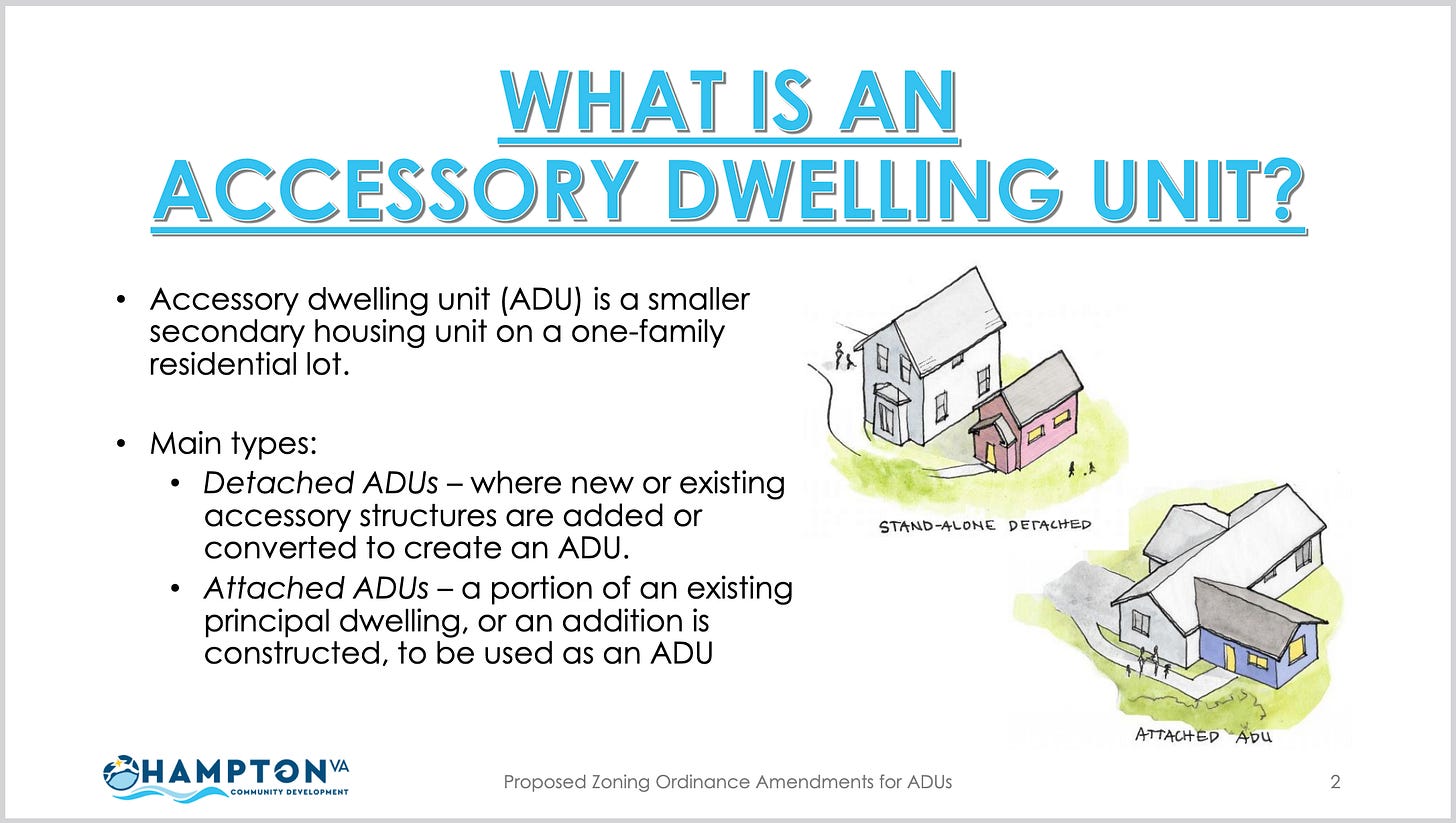Hampton Hopes Accessory Units Could Ease Affordable Housing Shortage
Planning Commission to review proposal allowing Accessory Dwelling Units citywide


When the Hampton Planning Commission meets Thursday afternoon, members will review a proposal that many hope could reshape the city’s housing landscape. The proposed changes would allow accessory dwelling units (ADUs) on single-family residential lots across the city. ADUs are generally smaller, secondary housing units that are either attached to or detached from a primary home already on the lot.
These units are seen by planners as a flexible option to address multiple housing goals in the City. Other Hampton Roads cities, including Newport News, Norfolk, and Virginia Beach, already allow ADUs under their zoning codes. Some of Hampton’s stated goals for allowing ADUs include:
Offer affordable housing opportunities in established neighborhoods.
Support young adults, seniors, and multigenerational households.
Provide homeowners with a potential source of rental income.
Under the draft proposal, each residential property would be permitted one ADU, with specific limits on size, height, and placement to ensure compatibility with surrounding homes.
Community input
Hampton’s effort to write an ADU ordinance began in late 2024, according to information that will be presented to the Planning Commission. Earlier this year, more than 360 residents completed a survey regarding ADUs, and an advisory committee was formed, which included neighborhood associations, builders, healthcare providers, and university faculty.
Among the findings, the survey revealed:
48% of respondents said they would consider adding an ADU to their property.
43% said they would use an ADU for a family member.
Residents ranked multigenerational living, housing affordability, and neighborhood compatibility as the most important factors.
Other survey results showed that opinions were more divided on some issues, particularly parking requirements and short-term rentals. Nearly half supported prohibiting ADUs from being used as short-term rentals, while the rest were split between opposing restrictions or expressing no preference.
In a summary of their community outreach efforts, staff stated that “[p]eople consistently told us they want options that strengthen families and neighborhoods, but not at the cost of character or safety”.
Proposed changes
Define ADUs formally in the zoning ordinance.
Permit ADUs by right on all one-family residential properties, subject to a Zoning Administrator Permit and development standards.
Set limits such as a maximum of 800 square feet or 50% of the main dwelling, whichever is smaller, and a maximum height of 16 feet.
Require setbacks consistent with accessory structures, ensuring ADUs do not extend beyond the front of the primary home.
Restrict uses, including prohibiting short-term rentals.
Amend parking rules to reduce burdens: no extra parking required for lots on streets with two-sided parking, but at least one off-street space for lots without on-street options.
Staff also propose allowing conversions of legally nonconforming structures, such as older garages, into ADUs if they meet safety requirements. City planners emphasized that enforcement mechanisms will be in place, requiring permits, inspections, and certificates of occupancy before any ADU can be occupied. Violations could result in fines or legal action.
Next steps
The September 18 presentation is intended as a briefing to the Planning Commission, with a final recommendation expected at the Commission’s October 16 meeting. If endorsed, the ordinance would move to City Council for consideration on November 12. City officials have set a target effective date of December 31, 2025.
If adopted, Hampton would become the latest Virginia city to embrace ADUs as a way to diversify housing stock while meeting the needs of seniors, students, young families, and others seeking affordable options within established neighborhoods.
A Hampton Daily contributor used AI tools and these sources:
